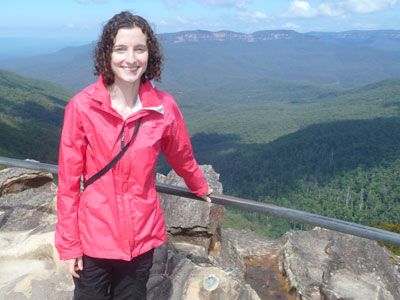
Val Carson joins the faculty early in 2013; she's interested in understanding more about fostering healthy physical activity habits in very young children.
If we want to foster healthy, active lifestyles in people throughout their lives, we need to start at the beginning - with the very young, according to Dr. Valerie Carson, the faculty's newest academic hire.
A newly-minted professor in behavioural medicine, Carson's research focuses on understanding sedentary behaviour and physical activity, particularly in relation to young people's health.
"My graduate work has primarily involved examining the relationship between physical activity, sedentary behaviour, obesity, and other health outcomes and identifying the determinants that influence physical activity and sedentary behaviour," says Carson. "While my work has spanned 0- to 19-year olds, I have a particular interest in the early years (children less than five-years old) because, increasingly, research supports intervening as early as possible to promote a healthy active lifestyle."
Carson earned her master's degree at the University of Alberta, studying with John Spence, before completing a doctoral degree at Queen's University in Ontario, where she was awarded - among many other honours - the CIHR Frederick Banting and Charles Best Canada Graduate Scholarship - Doctoral Award.
She was also one of the co-authors of the much-anticipated "Canadian Sedentary Behaviour Guidelines for the Early Years: 0-4 years" which suggested, among other recommendations, that children under age two simply shouldn't be watching television at all.
Her high profile graduate research this year earned her a 2012 Endeavour Research Fellowship Award from Australia Awards and she's currently in Australia working on a post-doctoral fellowship at Deakin University in Melbourne till October.
"I will be working on several ongoing projects during my post-doctoral fellow in Australia. Two of these projects include Transform-Us! and Healthy Active Preschool Years (HAPPY)," says Carson.
"Transform Us! is an 18-month behavioural and environmental intervention in the school and family settings targeting physical activity and sedentary behaviour among 8-9 year olds from 20 schools in Melbourne, Australia. HAPPY is a cohort study established to investigate the determinants of physical activity and sedentary behaviour, and to track changes in these behaviours among young Australian children over time."
When she returns to Canada to join the faculty in January, 2013, Carson says, "I would like to begin to conduct theory-driven interventions aiming to foster appropriate physical activity and sedentary behaviour habits in young people. This could potentially involve targeting parents of young children as well as child care centres and schools."
In an age where technology is creating more artful digital ways for working, being creative, socializing entertaining and being entertained without having to leave one's chair, Carson's research has critical relevance as sedentary behaviours increase. "Evidence indicates that a lack of physical activity and excessive sedentary behaviour among young people have important short- and long-term health and economic consequences," she says. "Therefore, there is a crucial need to identify effective and cost-effective strategies to increase physical activity and decrease sedentary behaviour that translate into improved health outcomes among young people."
Returning to the University of Alberta will be a journey come full circle for Carson.
"The past five years of my graduate training has been an amazing journey. I have been fortunate to have a supportive husband beside me the entire time. Therefore, the thing I am looking forward to most when returning to Canada and the University of Alberta is finally settling in one location to allow us both to establish our careers. We are both really happy that we will be calling Edmonton home (again!)"